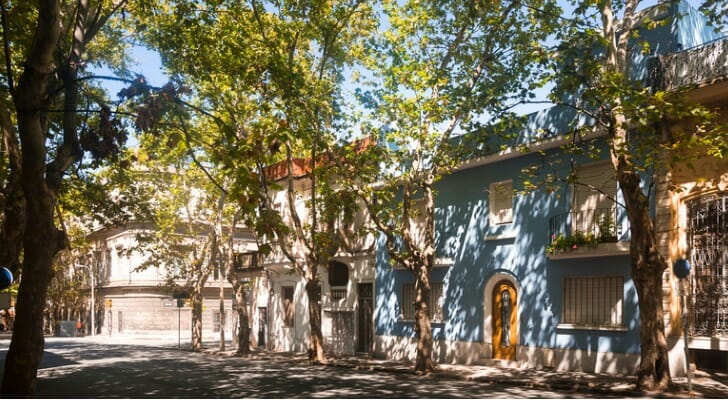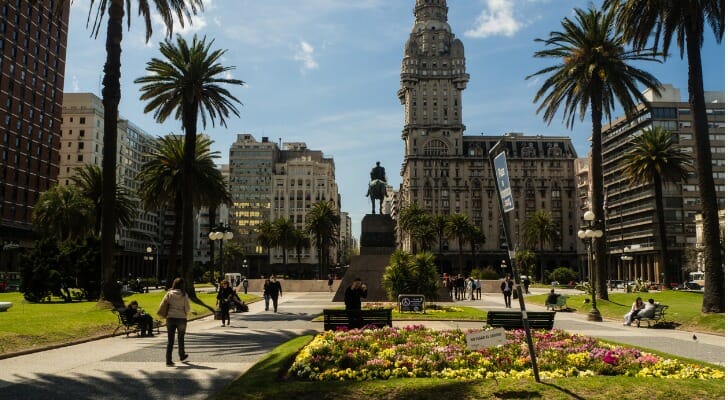Uruguay has become a popular retirement destination due to its warm climate and affordable living. This South American country is located between Argentina and Brazil and is known for its friendly citizens and rich culture. Not surprisingly, it’s a global favorite for retirees. If retiring in Uruguay piques your curiosity, make sure you understand the country’s cost of living, healthcare system, favorable tax environment, immigration laws and more.
A financial advisor can help you research the exchange rates and tax laws for your international retirement plans.
Cost of Living in Uruguay
It’s no wonder that retirees flock to Uruguay. This vibrant country offers a stable economy, mild climate, safe drinking water, affordable healthcare and beautiful beaches. While Uruguay isn’t the cheapest South American country, expenses do tend to be quite a bit less than what you would see living in the United States.
According to January 2026 data from Numbeo.com, a website that collects pricing data from citizens, the cost of living in Uruguay is 19% lower than in the United States, not including rental prices.
While the cost of living will depend on your lifestyle and exact location, you should probably plan a monthly retirement budget (including rent)of about $4,300 for a family of four or approximately $1,500 for a single person. Quality housing can be very affordable for retirees in Uruguay.
Health Care in Uruguay
Many retirees seek low-cost healthcare plans. Fortunately, Uruguay has a robust health care system that has no restrictions and offers health care and quality medical treatment to everyone who resides in the country.
What makes Uruguay stand out is its private hospital membership plan known as Mutualista. After the membership is accepted, the hospital offers members healthcare ranging from doctors’ visits to emergency room care. The monthly membership fee for this plan is often between $100 and $300, with a small co-pay when you visit a doctor.
It’s important to note that Uruguay is not a medical tourist destination. This means that if you’re traveling to Uruguay and need medical attention it may be quite expensive. However, for expats and locals, long-term health care plans can offer security and value.
Uruguay has also introduced a Provisional Identity Card that lasts for 180 days and can be extended for another 180 days. These cards are for remote workers looking to live in the country for a period of time and can help you determine if it’s the right retirement location for you.
Visa Laws in Uruguay
There are a couple of options for visas in Uruguay. The most popular is a retirement visa. This will allow you to bring your vehicle with you without paying taxes and will get you a Uruguayan passport. This visa has no income requirement but is time-consuming to obtain.
When applying for residency and a visa, you must go to immigration. A permanent residency application can take months or years to process – some people report the process taking up to two years. Fortunately, you do not need a permanent resident visa or passport to begin living in Uruguay full-time.
After five years of full-time residency, you can apply for citizenship. To gain citizenship, you must be able to prove that you spend most of your time in Uruguay and intend to continue living there. You may maintain your American citizenship and hold two passports if you wish.
Housing in Uruguay

Renting property in Uruguay is fairly straightforward. The national average cost for a one-bedroom apartment in Uruguay is around $630 per month in the city center and $490 per month outside of the center of the city. In Montevideo, the nation’s most expensive city, this average increases. But it’s still less expensive than New York City where an average 1-bedroom apartment costs more than $4,000 per month.
Uruguay is known for being one of the most stable places in South America to purchase a home. In recent years, an increasing percentage of Americans and Europeans have been buying properties in Uruguay.
Housing Process in Uruguay
Natives and non-Uruguayan citizens are under the same purview when it comes to purchasing properties in Uruguay. However, you must use a public notary to prepare any legal documents and to advise that all documents are in order. For example, they will advise on if there are outstanding debts on the property or anything else that would prevent you from purchasing the home.
As you look for areas to live in, remember that Uruguay experiences all four seasons. Additionally, some areas are more attractive to expats than others. As you research areas, be sure to enlist the help of a lawyer, notary, and real estate agent for future assistance.
Once you have found a property that you want to pursue, the formal home-buying process begins with a boleto de reserva or a reservation contract. The buyer and seller will each review the contract and sign it in the presence of the notary. At this time, a deposit becomes necessary. This deposit is easily compared to a down payment in the United States. This is typically between 10-20% of the selling price of the property, and the lawyer will hold the payment until the transaction is complete.
Then, the notary gathers all the documents necessary for the transfer of ownership. This includes the title, tax receipts, and any statements of debt on the property. They will also research the history of the property going back at least 30 years. This ensures that there are no legal issues with the property. Once this is complete, the buyer, seller, and anyone else who’s part of the sale of the property will meet with the notary to confirm all the documents are accurate.
The notary then has one month to write the new deed to the home, pay any taxes, and register the deed with the local government. Then, any payments are due, the documents are signed, and the buyer must purchase homeowner’s insurance.
Taxes in Uruguay
Uruguay has a territorial tax system. This means that if you’re a resident of Uruguay you don’t need to report many types of income from outside the country. This includes retirement pensions, Social Security payments, rental income and capital gains. Because many other countries require residents to pay taxes on worldwide income, this is a plus for this destination. However, territorial taxation does apply to interest and dividend payments. So, if you’re a resident you will need to pay a flat 12% tax on capital income and up to 36% on earned income.
This rule helps to discourage Uruguayans from keeping savings outside of the country. If you paid 12% in taxes to a jurisdiction outside Uruguay, then you may avoid taxes. If you paid less, you would simply pay the difference. Therefore, for many retirees, this tax has little impact on them.
For those who earn an income in Uruguay, you’ll receive an income tax which is known as impuesto a la renta para personas físicas (IRPF). This tax applies to annual income over UYU$ 52,608 ($1,347 at the exchange rate as of January 2026) and can range between 10% and 36%. For non-residents, a flat income tax of 25% may be charged on all income.
You’ll still need to file a U.S. tax return as an expat. This is true even if you don’t end up having to pay any U.S. taxes. It’s unlikely you’ll have much income originating from outside the U.S. in retirement.
These include the foreign earned income exclusion, the foreign tax credit, and the foreign housing exclusion, among others. If you’d like to forecast your tax burden more specifically, you may want to consult with a tax expert. Try to look for anyone who is familiar with both U.S. and Uruguayan tax laws.
Bottom Line

With a mild climate, vibrant culture, and striking landscapes, it makes sense why you would want to retire in Uruguay. Additionally, the friendly locals and low crime rates make it a very attractive place to spend your golden years. There are ways to test out the country before making it your full-time retirement location, like planning a visit and then speaking with your financial advisor about your options.
Tips for Saving for Retirement
- Consider talking to a financial advisor about whether you’re financially prepared to retire outside the United States. Finding a financial advisor doesn’t have to be hard. SmartAsset’s free tool matches you with vetted financial advisors who serve your area, and you can have a free introductory call with your advisor matches to decide which one you feel is right for you. If you’re ready to find an advisor who can help you achieve your financial goals, get started now.
- There are many different ways to save for retirement. You’ll most likely need to supplement the income you receive from Social Security; the most popular vehicles are IRAs and 401(k) plans. Whatever you do, start early so you can take advantage of compound interest. Use our retirement calculator to see if you’re on pace to meet your retirement income needs.
Photo credit: ©iStock.com/Erlantz Pérez Rodríguez, ©iStock.com/RicardoKuhl, ©iStock.com/JackF
